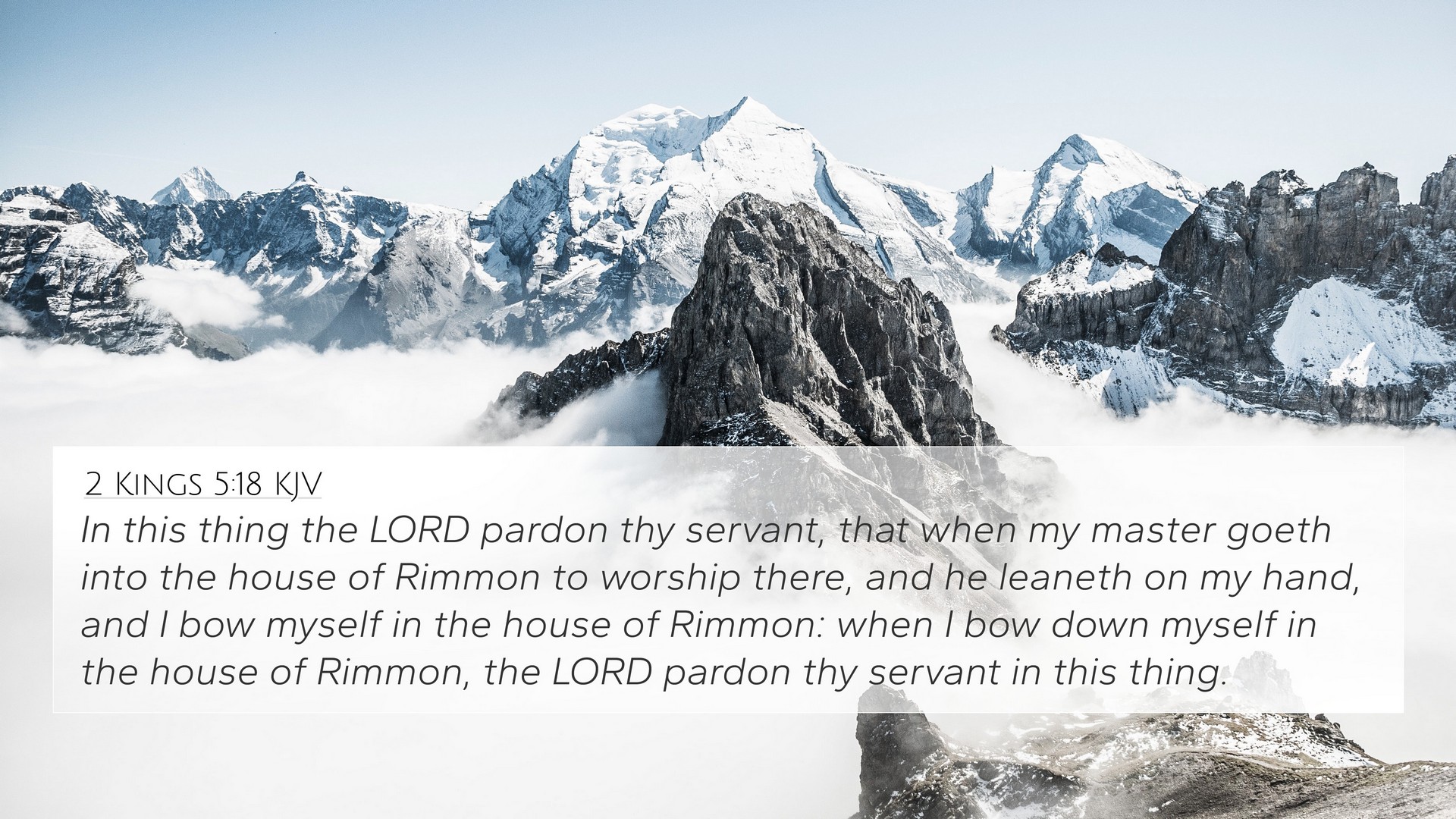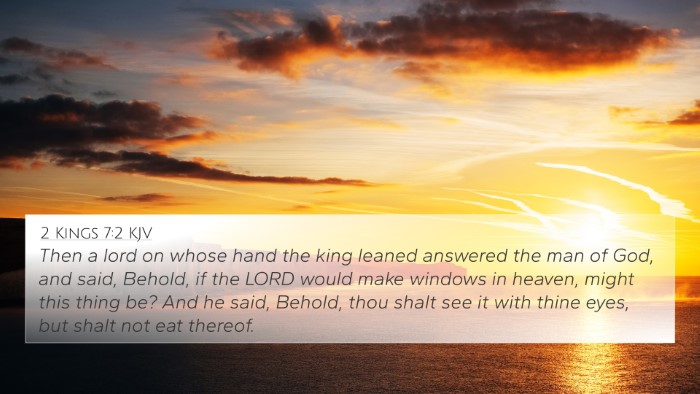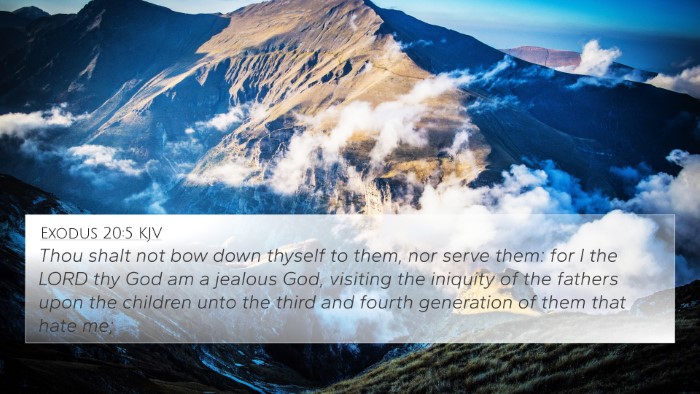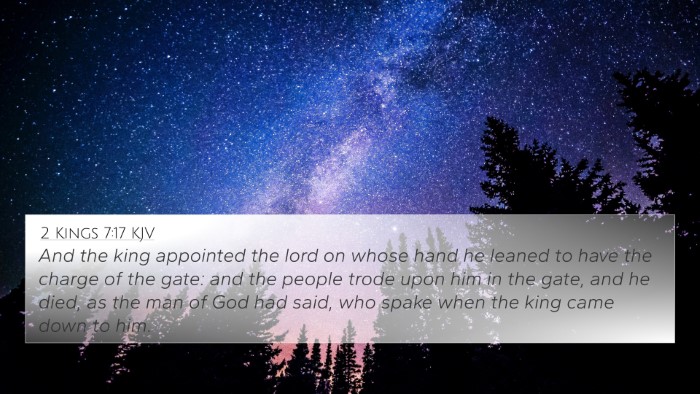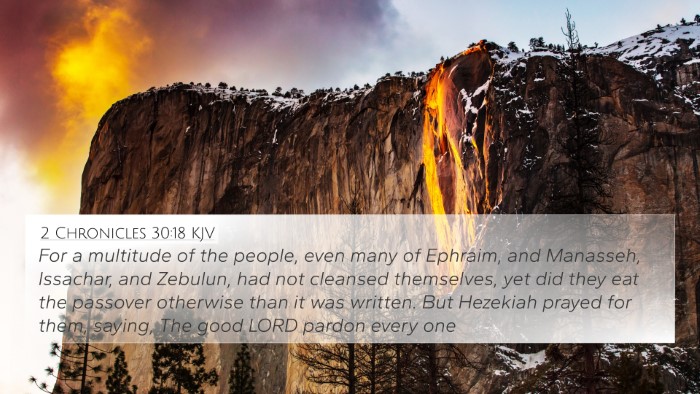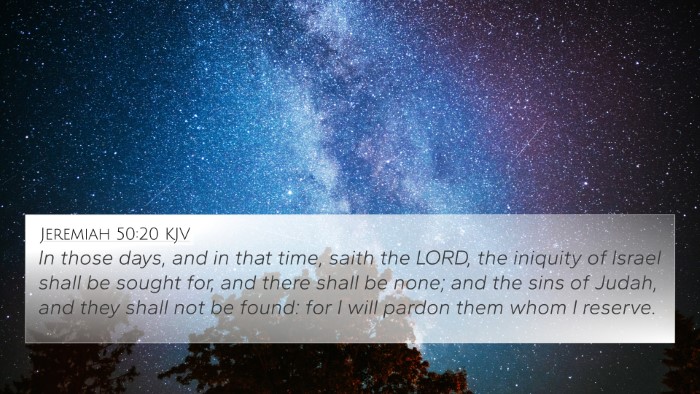Understanding 2 Kings 5:18
Verse: 2 Kings 5:18 - "In this matter may the LORD pardon your servant: When my master goeth into the house of Rimmon to worship there, and he leaneth on my hand, and I bow myself in the house of Rimmon: when I bow down myself in the house of Rimmon, the LORD pardon thy servant in this matter."
Summary of Meaning
This verse highlights a profound conversation between Naaman, a Syrian general, and Elisha, the prophet of Israel. After being healed of leprosy, Naaman expresses his concern over his duties to his king, which entail worshiping in the temple of Rimmon, a pagan deity. He asks for God’s pardon in advance for what he perceives as an act of compromise to his newfound faith.
Commentary Insights
- Matthew Henry:
Henry notes the complexity of Naaman's situation. Although he has turned to the God of Israel, he remains in a position that requires him to partake in acts contrary to the worship of Yahweh. Naaman's request for pardon indicates a sincere wrestling with the realities of his responsibilities as a servant of the king.
- Albert Barnes:
Barnes emphasizes the cultural and religious tension present in this verse. He explains that Naaman, although now a follower of the God of Israel, is still obliged to perform rituals in the service of a false god. His plea is a reminder of the struggle many face when navigating faith in a world that often demands loyalty to contrary beliefs.
- Adam Clarke:
Clarke elaborates on the concept of divine forgiveness in this context. He underlines that Naaman's understanding of God’s grace reflects an important biblical theme: that God sees the intentions of the heart. Though physically present in a pagan temple, Naaman's heart yearns for the true God, showcasing the inner conflict between faith and obligation.
Bible Cross References
To gain a deeper understanding of 2 Kings 5:18, it can be helpful to explore other related scripture. Here are some significant cross-references:
- Exodus 20:3-5 - Discusses the command against idolatry, highlighting the tension Naaman faces.
- 1 Kings 18:21 - Elijah's challenge to the Israelites about serving the Lord versus Baal relates to Naaman's situation.
- Isaiah 45:22 - God's call for all nations to look to Him can connect with Naaman's journey to faith.
- Romans 14:23 - Addresses the faith of individuals in their actions, mirroring Naaman’s contemplation of his duties.
- Galatians 2:20 - Paul’s proclamation of living through Christ reflects the transformative faith Naaman experiences.
- Acts 10:34-35 - God shows no partiality, and acceptance of all who fear Him is a key theme in Naaman’s story.
- Matthew 9:10-13 - The discussion of mercy over sacrifice draws parallels to Naaman's plea for understanding from God.
Thematic Connections
The themes found within 2 Kings 5:18 resonate throughout scripture. Here are some key themes to consider:
- Faith over Tradition: Naaman’s experience exemplifies the struggle between adhering to established rituals and embracing true faith.
- God’s Grace and Forgiveness: The plea for pardon highlights themes of grace present in the New Testament, reinforcing that God understands our heart's intent.
- Cultural Context of Worship: Naaman's situation examines how cultural obligations impact worship and the complexities of faith amidst societal expectations.
Conclusion
2 Kings 5:18 serves as a poignant reminder of the struggles faced by believers in a world filled with conflicting values. Naaman's request reflects sincere devotion while highlighting the challenges of living out faith amid cultural expectations. By studying this verse in conjunction with others, we can appreciate the broader narrative of God's mercy and grace, encouraging us to seek understanding and connection among the scriptures.
Further Study and Resources
Engaging with tools for Bible cross-referencing can deepen your understanding of interconnected scriptural themes. Utilizing a Bible concordance or a cross-reference Bible study guide can help trace links between verses and explore comprehensive Bible themes. By focusing on how to use Bible cross-references, you can enrich your personal study and enhance sermon preparation through systematic study of scriptural connections.
